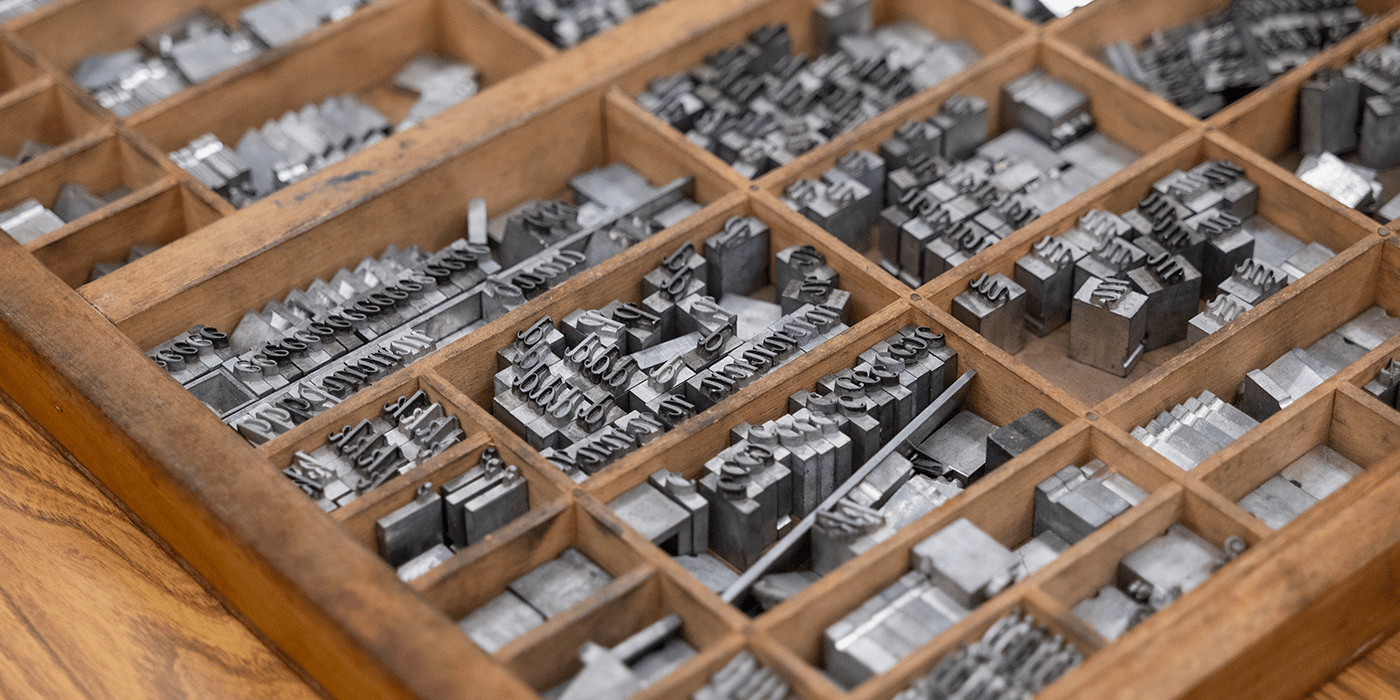UMD Libraries Announce Gift of 150-Year-Old Printing Presses
Presses will anchor new letterpress studio in Hornbake Library and allow students hands-on history lesson

The University of Maryland Libraries are excited to announce the acquisition of two 19th-century iron Washington hand presses donated to Special Collections and University Archives by Christopher and Patricia Manson of Rockville, MD and Ellie Denker of Potomac, MD. These gifts will be the foundation for a new letterpress printing studio on the ground floor of Hornbake Library, set to open in 2025.
The printing presses were manufactured by the R. Hoe & Co. of New York & London circa 1870. The press donated by the Mansons was formerly owned by Roland Hoover (1929–2018), a letterpress printer and designer who operated the Pembroke Press in Bethesda, MD. Christopher Manson, proprietor of the Crooked Crow Press in Rockville, MD, and a friend of Hoover’s, donated the press along with wood type and type cabinets to be used in the letterpress studio.
The press donated by Denker was operated by her husband Michael Denker (1946-2013), former president of the Chesapeake Chapter of the American Printing History Association (APHA), letterpress printer, and proprietor of the Stoney Creek Press in Potomac, MD. Along with the printing press, Denker donated additional type and printing supplies to equip the letterpress studio.
The Washington hand press was a dominant printing press design in 19th-century America, due to its durability, ease of use, and sturdy iron construction. The 1,800-lb machine is operated manually by pulling a lever to apply pressure. In letterpress printing, movable type and graphics, such as woodblocks, are set in a frame (or “chase”) on the bed of the press, which is then inked. Paper is placed on top and slid under the platen, where pressure is applied to the paper to create an impression.
Both Washington hand presses in Hornbake Library have a connection to the local letterpress community. Doug McElrath, Director of Special Collections, spoke to the special nature of these gifts: “I met both Mike Denker and Roland Hoover soon after I joined the Chesapeake Chapter of the American Printing History Association. Each of them impressed me with their dedication to the craft of printing and their desire to share their knowledge with the next generation. Roland and Mike were pillars of a vibrant community of printing enthusiasts that remains active in our mid-Atlantic region, and it is especially fitting that the two iron presses they used now stand side by side in the Hornbake Library Letterpress Studio. Their legacy will continue to resonate with students and others whose eyes are opened through the experience of letterpress printing at the University of Maryland.”
At over 150 years old, not many Washington hand presses are still in use today, which makes these gifts a unique and valuable learning tool. It will be the centerpiece of the forthcoming Hornbake Library Letterpress Studio, which will provide hands-on instruction for students to learn through embodied practice. More broadly, students can engage with the skilled technique of transforming ideas into physical words on a page, illuminating the creativity and craftsmanship of letterpress printing.
SCUA’s Literature and Rare Books collections in Hornbake Library are a long-established on-campus resource for studying the history of the book, with collections strengths in private press printing, typography, book arts, and illustration. The new studio will be an extension of our commitment to enhance our collections with innovative and user-centered projects—an educational space for students, faculty, staff, alumni, and the local community to explore the craft of printing and engage directly with printing techniques and history.
Amber Kohl, curator of Literature and Rare Books collections, is excited about the impact of the donations. “With these generous gifts and the forthcoming letterpress studio in Special Collections, we can directly engage with a broader spectrum of students and create an open discourse on the power, creativity, and cultural impact of the printing press. Our book history collections will take new life as students learn firsthand how to set type, ink a form, and take a pull on the 19th-century printing press to transform their words onto print.”
These donations will allow SCUA staff to expand instruction and outreach and create new opportunities to engage with the campus community and beyond. For more information, contact Amber Kohl (amberk@umd.edu) and check out the website for the Hornbake Library Letterpress Studio for updates.